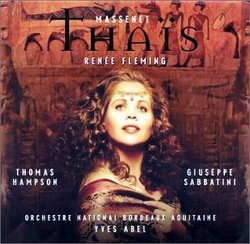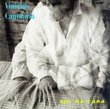| All Artists: Jules Massenet, Orchestre National Bordeaux Aquitaine, Renée Fleming, Thomas Hampson, Yves Abel, Giuseppe Sabbatini, Elisabeth Vidal, Marie Devellereau, Enkelejda Shkosa, Stefano Palatchi Title: Massenet - Tha´s / Fleming, Hampson, Sabbatini, Shkosa, Vidal, Devellereau, Cals, Yves Abel Members Wishing: 0 Total Copies: 0 Label: Decca Original Release Date: 1/1/2000 Re-Release Date: 8/22/2000 Genre: Classical Style: Opera & Classical Vocal Number of Discs: 2 SwapaCD Credits: 2 UPC: 028946676622 |
Search - Jules Massenet, Orchestre National Bordeaux Aquitaine, Renée Fleming :: Massenet - Tha´s / Fleming, Hampson, Sabbatini, Shkosa, Vidal, Devellereau, Cals, Yves Abel
 | Jules Massenet, Orchestre National Bordeaux Aquitaine, Renée Fleming Massenet - Tha´s / Fleming, Hampson, Sabbatini, Shkosa, Vidal, Devellereau, Cals, Yves Abel Genre: Classical
Given the renaissance in recent years of an interest in Jules Massenet--consider, for example, the 1999 release of two Werthers back to back--the time definitely has become ripe for a new account of his late opera, Tha&... more » |
Larger Image |
CD DetailsSynopsis
Amazon.com Given the renaissance in recent years of an interest in Jules Massenet--consider, for example, the 1999 release of two Werthers back to back--the time definitely has become ripe for a new account of his late opera, Thaïs. This is the first alternative to appear on CD since the problematic version with Beverly Sills from the 1970s. While far from flawless (curiously, it was recorded in two stretches, with a pause of 15 months between them), it makes a mostly convincing case for the stirring beauty of Massenet's much-misunderstood work. For Thaïs, with its exotic setting in Egypt of the early Christian period, achieves much more than the sentimental romanticism often conveyed in out-of-context performances of its best-known excerpt, the violin instrumental Meditation. A kind of Tannhäuser in reverse, this story of sin and an illusory quest for salvation (adapted from Anatole France's novel) has its two main figures--the monk Athanaël and the beautiful courtesan Thaïs --crisscross in their interior journeys, only to end by arriving at diametrically opposed destinies (in a chiasmus that is the exact opposite of the one depicted in Tennessee Williams's Summer and Smoke). Many will seek out this account chiefly for the presence of Renée Fleming in the title role, and she indeed crafts a memorable portrayal of Thaïs's path from worldly irony to trusting soul. Fleming deploys her familiar, unique vocal style with subtlety for the earlier scenes of Thaïs as courtesan, delivering her great aria of doubt with a Marschallin-like vulnerability. Indeed, it's the breathy sumptuousness typical of her voice that makes the converted Thaïs almost more of a challenge--although Fleming does achieve a noticeable softening effect, above all in her death scene. As the monk who tries to repress his very worldly feelings for Thaïs, Thomas Hampson clearly carries the seeds of doubt from his first scene; if anything, the contrast between his two selves isn't stark enough, and he brings too much vocal polish to the scenes where we should hear a John the Baptist in hair shirt. Still, Hampson's sensitivity, however reserved, elicits the crucial sense of compassion for Athanaël's predicament. As Nicias, the cultured lover of Thaïs, Giuseppe Sabbatini is excellent--their bittersweet farewell duet actually contains some of the best chemistry on the whole set. True, Massenet's score succumbs to passages of filler (for example, much of the ballet music) that aren't at the level of its more inspired lyrical stretches, but young conductor Yves Abel (making his Decca debut) captures its integral, supple beauty despite some roughness in transitions and an occasionally raw surface from the orchestra. Sound balances are less than ideal. An excellent booklet with full libretto is included. --Thomas May Similarly Requested CDs
|
CD ReviewsAT LONG LAST, A REALLY FINE RECORDING OF "THAIS" lesismore26 | Chicago, Illinois USA | 08/27/2000 (5 out of 5 stars) "This new recording of "Thais" fills a huge hole in the catalogue of recorded opera. This opera, while never enjoying the popularity of "Manon" or "Werther", still contains some beautiful music, and it has only now finally received a recording of real value. True, it has been recorded twice over the last thirty years (on RCA in 1974 with Anna Moffo, Jose Carreras and Gabriel Bacquier and again in 1976 on EMI with Beverly Sills, Nicolai Gedda, and Sherrill Milnes), but neither recording proved very satisfying due in great part to the fact that each of the respective sopranos in the title role (Moffo and Sills, respectively) were already past their best singing days. This is certainly no issue in the case of Renee Fleming, whose gorgeous voice is ideal for the role of the courtesan-turned nun. Fleming sounds wonderfully youthful and she sings with an all-encompassing freedom ---- especially in her pivotal Mirror Aria. Equally importantly, she is deeply involved in the drama. Fleming is supported beautifully by the liquid and beautiful singing of Thomas Hampson, whose Athanael easily surpasses any of the roles previous recorded interpreters. Hampson's beautiful rendition of "O Seigneur, je remets mon ame entre tes mains" is one of the highlights of this recording, and it shouldn't be missed. Plainly, it is Hampson's work that forms the backbone of the entire production. Giuseppe Sabbatini provides a lyrical and very well sung Nicias, a great improvement over Nicolai Gedda's aged sound on the EMI recording, but still not quite on the level of Jose Carreras on the no-longer available RCA set. The conducting of Yves Abel is atmospheric and compelling. For those who have waited for years for a really fine recording of this beautiful Massenet opera, this recording will be the answer to their prayers. For those who want to experience this opera for the first time, this is the recording to do it with. Very highly recommended." Luscious! And deeper than you might think. Julian Grant | London, Beijing, New York | 08/23/2000 (4 out of 5 stars) "Massenet's 'Thais' has a reputation for being tawdry, glitzy, a piece of French patisserie that relies on the prima donna taking her clothes off to work - well all this is very fully and wittily refuted in Rodney Milnes excellent essay in the booklet that accompanies these CD's. The music is gorgeous, and along with the very different 'Werther' this must be Massenet's most tightly wrought score, and I'm sure this recording will make it many new friends.In the mid 1970's, when the Massenet revival got going, 2 new recordings of 'Thais' appeared, both with leading ladies from the US - Beverly Sills and Anna Moffo - both of which were compromised, the Sills recorded a little late in her career, with very matter of fact, charmless conducting from Maazel (available on an EMI set), and Moffo, very characterful but in a parlous vocal state - with a wonderful Athanael from Gabriel Bacquier and extremely accomplished orchestra playing and conducting from Julius Rudel. This latter version never made it onto CD. It's taken a whole generation to get a new recording, so, how does it stand up?By and large very well indeed. Thomas Hampson portrays Athanael, the monk who sets out to take Thais the courtesan away from the sins of the flesh only to discover them himself. It is a restrained performance, lacking the last ounce of anguish in the latter stages, he is not inside the character in the way that Bacquier was, but it is well sung with austere authority. Giuseppe Sabbatini is a fresh voiced eager Nicias. Supporting roles are well taken, with a delightful cameo from Elizabeth Vidal (a lemony French voice of the old school) as La Charmeuse in the ballet sequence. The orchestra, from Bordeaux, under recording newcomer Yves Abel acquits itself well, though it is not the equal of Rudel's forces - and occasionally tempi are slightly rushed, and the odd nuance rode rough-shod over, but in general the fin-de-siecle glow of Massenet's orchestration is revealed in all its glory. The recording quality is a little inconsistent, the perspective changes, noticeably the relation between voice and orchestra - the opera was recorded in two sessions over a year apart - a little odd. Did some singers phone their parts in! But you're not going to buy this set for the above: it really all rides on La Fleming - yet another American soprano (mind you, Massenet wrote the piece for his favourite, Sybil Sanderson, also from the US). Well, it's a triumph - she sounds totally inside the role. The great second act aria 'Dis-moi que je suis belle', is a virtuoso showcase for pointing the text, Massenet's very detailed word setting is delivered, pointed, and relished - and her tone is refulgent, simply sumptuous, over a range of more than two octaves. The Oasis scene, heart of the work brings out the best from both protagonists. And if you've never heard the final duet from this opera, as Thais lies on her deathbed having visions of angels, and Athanael desperately tries to tell her its all untrue and only sex matters - all this to the melody of the famous 'Meditation' (how good a piece it is in context), then click and buy this set now! And if you do know it you'll need no persuading from me: it's one of the glories of French opera." The Best "Thais" Currently Available Jeffrey Lipscomb | Sacramento, CA United States | 05/12/2005 (4 out of 5 stars) "This account of "Thais" has a lot going for it: Fleming's full-voiced soprano in the title role, Hampton's competent if slightly one-dimensional baritone, and generally excellent recorded sound. So if you are looking for a good recording of Massenet's under-rated exotic masterpiece, this one strikes me as the best version currently on the market.
But there is another "Thais," sadly out of print, that I prefer to this one. It has an all-French cast that, to my ears, is more sensitive to the sensuality of the French language. Recorded in 1961, it was one of the last French opera recordings to feature an "old fashioned" French orchestra (now an extinct species) whose sound - wooden flutes, French bassoons, billowing winds - was probably what Massenet had in mind when he was composing. The conducting by seasoned opera veteran Jesus Etcheverry (born 1915) has more panache and variety than any other version I've heard. The title role is sung by Renee Doria, one of the great French bel canto sopranos. She does not match Fleming's freedom in the high notes but, to my ears, her characterization is more subtle and sympathetic. Robert Massard's Athanael has a darker and deeper baritone voice than Hampton's, and I think it's better suited to the role. Other members of the supporting cast - Janine Collard (Albine & Myrtale), Francoise Louvay (Crobyle), and Michel Senechal (Nicias) - are wonderfully idiomatic and stylish. This set was last available as a 2-disc offering on the Accord CD label (it lasts exactly two hours and is reasonably complete). I was lucky to find a copy second-hand a few years ago and, while not perfect (it lacks the important Act III, scene 2 that portrays Athanael's vision), I think it's over-all this opera's finest recorded account. To summarize: this "Thais" from Fleming & Co. is the best available recording. But if the 1961 Doria/Massard account ever gets re-issued, don't hesitate: it's the most idiomatically-French version of all." |

 Track Listings (24) - Disc #1
Track Listings (24) - Disc #1





